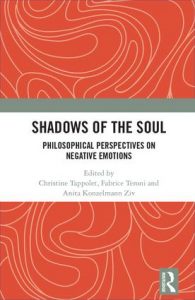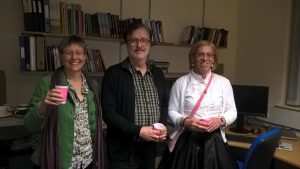Luca completed a PhD in the philosophy of science with us in 2014. As well as being a philosopher he is a journalist and writer. And, it turns out, a traveller. He has just published a book, Oltre e un cielo in più. This documents his four-month journey from Skye to Japan. It is in Italian (he is Sicilian) but you can read a google-translated review from the newspaper La Repubblica here (original review here).

Author Archives: admin
Sophie-Grace Chappell on ‘Virtue Ethics and Climate Change’
Our seminar speaker next week, February 7th, will be our very own Sophie-Grace Chappell. Details below.
‘Virtue Ethics and Climate Change’
This paper is more about virtue ethics than climate change. It discusses two possible virtue-ethical approaches to climate change and similar issues in “emergency ethics”, one that takes virtue ethics to be a systematic moral theory of the usual sort, the other that takes virtue ethics to be a broader and looser approach to ethics–an ethical outlook. It considers two objections, the timescale objection and the authority objection. To the former of these, either version of virtue ethics seems more vulnerable than other approaches in ethics, but I suggest remedies from McDowell and Aquinas. To the latter objection, I suggest that the general moral scepticism that underlies it is better outflanked than attacked directly. I aim to outflank it by proposing what I call enchanted realism, which is a metaethics which I think goes particularly well with virtue ethics, and which is also highly pertinent to the issue of climate change.
It will run from 2-4pm in CMR15. All welcome!
New Routledge collection, ‘Shadows of the Soul…’, with an entry by Carolyn Price is out now
Carolyn Price has contributed a chapter to a new collection – Shadows of the Soul: Philosophical Perspectives on Negative Emotions, which has just been published by Routledge. The collection, edited by Christine Tappolet, Fabrice Teroni and Anita Konzelmann Ziv, explores the nature and value of negative emotions, such as anxiety, shame and jealousy. The book is aimed at specialists and non-specialists alike. Carolyn’s chapter is on grief: she explores why some philosophers have held that we would be better off without grief, and she explains why she thinks they are wrong.
Heritage in War now on OpenLearn
Professor Derek Matravers considers the treatment of cultural heritage in war and the philosophical questions that need to be asked to protect cultural property. See a video for this and more on OpenLearn
Global Philosophy Program on Free Speech
Join the global discussion……with Professor Michael Sandel
Live Debate:
This is the latest philosophical question Professor Michael Sandel and the Global Philosophy Facebook group will be discussing live this Friday 26 January from 16.00 to 17.30.
The debate will be streamed live to the Global Philosophy Club Facebook group, so please do join us and share your comments and thoughts. . Some of your comments will be relayed to Prof Sandel during the session for live debate.
Everyone is invited, all you need is an internet connection.
If you want to join in the discussion, become a member of the group here: https://www.facebook.com/groups/globalphilosopher/about/
The debate can be viewed here:
https://www.facebook.com/groups/globalphilosopher/
Radio Broadcast:
A shorter version of the debate will subsequently be broadcast on BBC Radio 4 on Tuesday 6th February at 09.00-09.45. A video version, as well as previous debates are also available on the BBC Global Philosopher website: http://www.bbc.co.uk/programmes/b075ft6f
OpenLearn:
Our OpenLearn Global Philosophy pages also contain lots more information around philosophical themes, topic and questions. Explore further by visiting Open Learn:
http://www.open.edu/openlearn/tv-radio-events/radio/the-global-philosopher
Jon Phelan completes his doctorate
Liz Irvine’s talk, “Semantics in the Light of Interaction”
Dr. Liz Irvine (University of Cardiff) will start our 2018 seminar series with her talk, “Semantics in the Light of Interaction”
Abstract: In this talk I’ll argue that new psycholinguistic research on communicative interaction makes it possible to challenge a leading theory in the semantics vs. pragmatics debate (minimalism). This is surprising: semantic theories are not usually particularly empirically sensitive, but I’ll argue more generally that if they’re not empirically sensitive (in a particular sense), then it is not clear that they can fulfill a core part of their job description.
The talk will be held on Wednesday January 9th (2-4pm) at the Open University’s Campus at Walton Hall, in Room 006, Gardiner Building 1. All welcome.
The Global Philosophy Club
Join the new Global Philosophy Club, a collaboration between the OU and BBC Radio 4. The club is where you will find BBC content on philosophy, discuss ideas with others, and keep abreast of upcoming global debates.
For more info, click here
Jonathan Mitchell’s talk on Phenomenal Consciousness
We are pleased to restart our monthly seminar series with a talk by Dr. Jonathan Mitchell (University of Warwick), who will be talking about ‘Affective Representation in Phenomenal Consciousness’.
ABSTRACT: Many philosophers have sought to understand the representational dimension of different types of affective states along the model of sense-perceptual experiences, even claiming that the relevant affective experiences are perceptual experiences. In this paper, I argue that many affective experiences involve a kind of personal level representation called affective representation, which is significantly disanalogous with the representational character of paradigmatic perceptual experiences. My positive thesis is that affective representation is a non-transparent, non-sensory form of evaluative representation. In affective intentional experiences a felt valenced attitude (an ‘affective response’) represents the intentional object of the experience as minimally good or bad, and one experiences that evaluative standing as motivating – having ‘the power’ to motivate – the felt valenced attitude it does. I also show that by appreciating the distinctive character of affective representation, so framed, we can make better sense of some of the distinctive features of affective experiences, such as their valence, motivating power, and connection to value.
The talk will be held on Wednesday 6th of December (2-4pm) at the Open University’s Campus at Walton Hall, in Room 006, Gardiner Building 1. All welcome.




